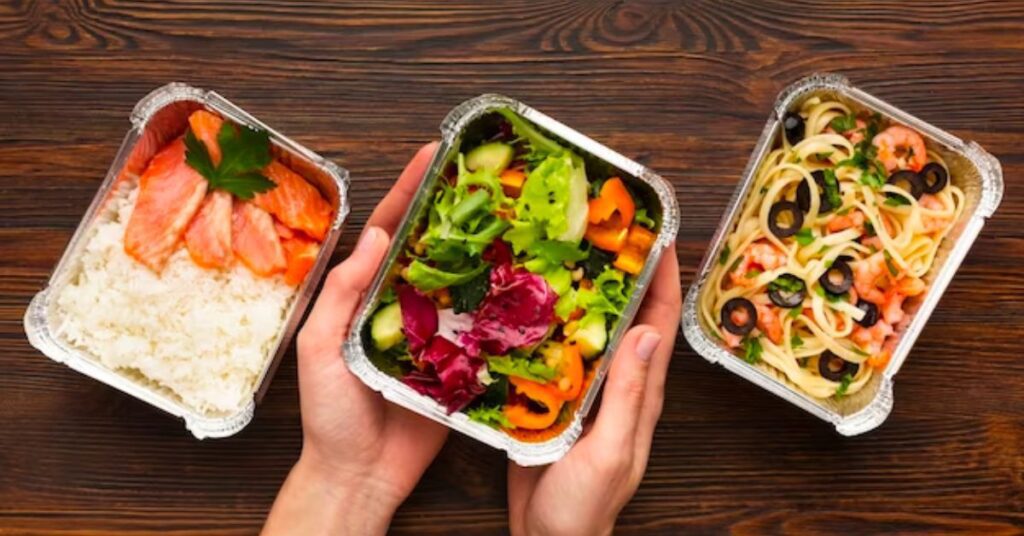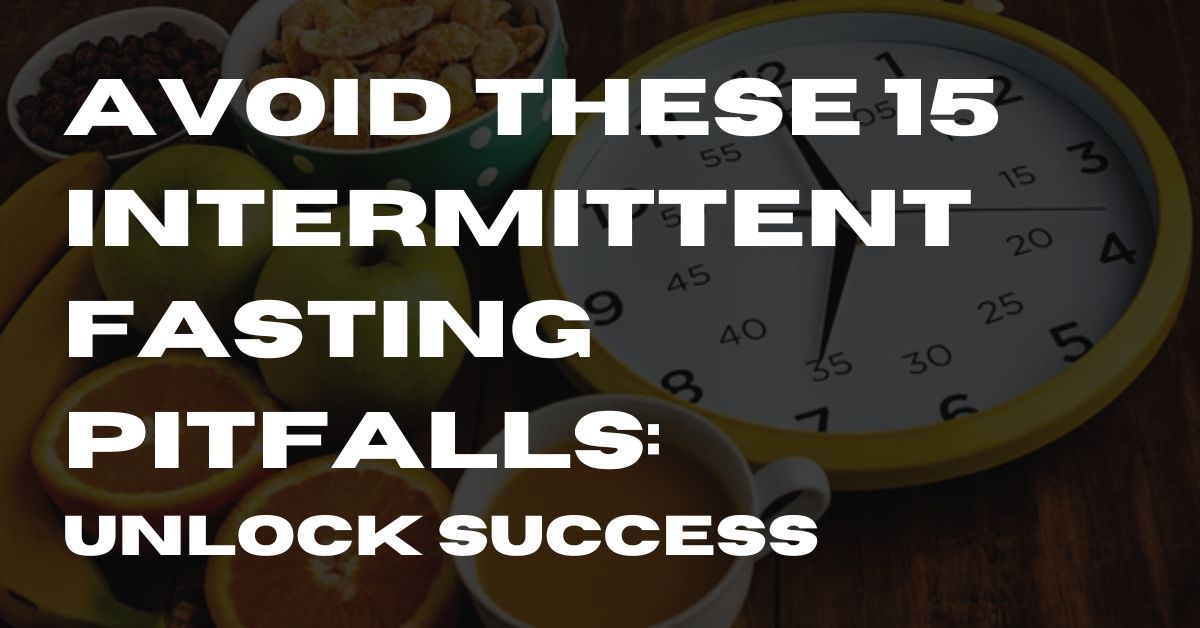Ever felt like you were running a marathon without knowing the route?
Well, that’s how intermittent fasting can sometimes feel if you’re not careful.
Are you eager to harness the power of intermittent fasting to boost your health and wellness? Fantastic.
But here’s the scoop: Some sneaky mistakes could slow down your progress or even derail your fasting journey.
Don’t worry, though; we’ve got your back.
In this guide, we’re going to unveil the 15 common intermittent fasting mistakes that could be standing between you and those amazing results you’ve been dreaming of.
Buckle up, because by the time we’re done, you’ll be equipped with the knowledge to supercharge your fasting game.
Table of Contents
What is Intermittent Fasting?
Intermittent fasting? It’s like the VIP pass to a healthier you.
Imagine this: a simple, flexible, and science-backed approach to eating that not only helps you shed those stubborn pounds but also offers a bouquet of health benefits.
So, what is it exactly? Intermittent fasting, or IF for short, is not a diet in the traditional sense.
It’s more like an eating pattern—a rhythmic dance between periods of eating and fasting.
Research has shown that IF can work wonders, from improving your metabolism and heart health to potentially extending your lifespan.
It’s all about when you eat, rather than what you eat.
And the best part? You don’t need fancy supplements or complicated meal plans.
Just a bit of knowledge and a willingness to give your digestive system some downtime.
Ready to dive in and discover how this approach can transform your life?
Let’s explore the world of intermittent fasting together.
Intermittent fasting Mistakes
Let’s tackle these intermittent fasting mistakes in an engaging and relatable manner:
Mistake #1: Skipping Hydration
The Blunder: You’ve plunged headfirst into the world of intermittent fasting, meticulously timing your eating windows.
It’s going smoothly, but there’s one vital component you’ve been skimping on – hydration.
You’re so focused on when to eat that you forget about what you should be drinking.
Well, here’s the straight truth: skipping out on water during fasting is like embarking on a smoothie and juice diet without the blender – you’re missing a crucial element.
The Solution: Hydration is your best friend during intermittent fasting, and here’s why:
- Beat the Parch: Fasting without proper hydration can leave you feeling parched and drained, much like a smoothie without its refreshing juice base.
- Hunger Hack: Sipping water, herbal teas, and even the occasional low-calorie smoothie or juice can help curb those sneaky hunger pangs that can throw your fasting off track.
A study published in the journal “frontiers” found that fasting can increase the risk of dehydration, especially if you’re not drinking enough water during non-fasting hours.
So, what’s the fix? Keep a water bottle close by and sip on it throughout the day. Herbal teas and occasional low-calorie smoothies or juices can also be your allies in the hydration game
Mistake #2: Overlooking Nutrient Balance
The Blunder: You’ve committed to intermittent fasting, diligently planning your eating windows.
It’s a great start, but there’s a crucial detail you might be neglecting – nutrient balance.
It’s like getting behind the wheel of a high-performance car and filling the tank with low-quality fuel; it might run, but it won’t run well.
The Solution: Nutrient balance is the name of the game, and here’s why:
- Stay Satisfied: Meals that combine protein, healthy fats, and fiber keep you feeling full and energized, making it easier to stick to your fasting plan.
- Fuel Efficiency: Think of your body as a finely tuned machine. Proper nutrition ensures it operates at peak performance, much like a high-octane fuel keeps your car running smoothly.
So, what’s the deal? Don’t just focus on when you eat; pay attention to what you eat.
Opt for meals that include a mix of protein, healthy fats, and fiber.
That way, your body gets the right nutrients to keep you satisfied, energized, and cruising smoothly through your intermittent fasting journey.
Mistake #3: Not Planning Meals

The Blunder: You’re rocking your intermittent fasting routine, strictly observing your eating windows.
But there’s a tiny hitch – you’re not planning your meals.
It’s like setting off on a cross-country road trip without a map; you’ll likely end up lost and hungry.
The Solution: Meal planning is your secret weapon, and here’s why:
- Smart Choices: Planning meals helps you make healthier choices and avoid last-minute, regrettable snacking decisions.
- Intermittent Fasting Meal Ideas: When you plan, you can incorporate nutritious, satisfying foods into your meals, making your fasting journey smoother.
So, what’s the fix? Invest some time in planning your meals.
Look up intermittent fasting meal ideas that tickle your taste buds and align with your fasting schedule.
When you know what you’re going to eat, you’re less likely to veer off course and more likely to succeed in your intermittent fasting journey.
Mistake #4: Ignoring Your Body’s Signals
The Blunder: You’re in the fasting zone, and suddenly, your stomach starts growling like a caged beast.
But your eating window isn’t open yet, so you try to tough it out.
Ignoring your body’s signals in this situation is like driving blindfolded – it’s a recipe for a bumpy ride.
The Solution: Tune in to what your body is telling you; it’s your ultimate guide:
- Listen Up: If you’re genuinely hungry outside of your eating window, it’s perfectly okay to make adjustments. Fasting should be flexible, not a form of self-inflicted torture.
So, what’s the deal? Pay attention to your body’s cues.
If it’s sending hunger signals, acknowledge them. You can adjust your fasting schedule or grab a small, healthy snack if needed
Mistake #5: Overeating During Eating Windows
The Blunder: Your eating window finally opens, and you dive in like it’s a buffet at the end of a desert island stint.
You’re so famished that you devour everything in sight.
Overeating during eating windows is like hitting the lottery jackpot and blowing it all in one go – it’s not a recipe for lasting satisfaction.
The Solution: It’s time to adopt a different approach to your eating windows:
- Start Small: Begin with a balanced, moderate-sized meal when you break your fast. Give your body time to register that it’s full.
- Savor the Flavor: Slow down, savor your food, and pay attention to your body’s cues. You’ll likely find that you’re satisfied with less.
Mistake #6: Not Listening to Your Body
The Blunder: You’re in the midst of your fasting window, and your body is waving the hunger flag.
But instead of heeding its signals, you push through, determined to stick to the clock.
Ignoring your body’s cues is like driving your car with the gas warning light on – it’s a risky move.
The Solution: It’s time to tune in and give your body the attention it deserves:
- Honor Hunger: If you’re genuinely hungry outside your fasting window, it’s okay to make adjustments. Fasting should be flexible, not a relentless pursuit of rigid rules.
So, what’s the deal? Your body is your ally, not your adversary, in the intermittent fasting journey.
Pay attention to its signals. If it tells you it’s hungry, respect that.
It’s all part of a mindful and flexible approach to fasting that ensures both your body and your goals are well taken care of.
Mistake #7: Neglecting Protein Intake
The Blunder: You’re diving headlong into the world of intermittent fasting, diligently adhering to your eating windows and watching the clock.
Yet, there’s an inadvertent omission – you’ve forgotten the crucial element of protein intake.
Neglecting protein is akin to commencing a road trip with an empty fuel tank; your journey won’t get very far.
The Solution: It’s time to embrace protein as your fasting ally:
- Protein Power: Protein acts as a superhero for your body, safeguarding your valuable muscle mass while fasting, and ensuring you remain robust and invigorated.
- Lean Sources: Incorporate lean meats, tofu, legumes, or other protein-rich foods into your meals to fulfill your protein requirements.
So, what’s the remedy? Don’t let your muscles go hungry during intermittent fasting.
Prioritize protein in your meals to uphold your vigor and vitality.
It’s not merely about when you eat; it’s also about what you eat to bolster your overall well-being and fasting objectives.
Mistake #8: Fasting Without a Support System
The Blunder: As you navigate your way through the journey of intermittent fasting, you might sometimes feel like you’re voyaging alone through turbulent waters.
You’ve been keeping your fasting experiences, inquiries, and victories locked inside, without sharing them with anyone.
Fasting without a support system is akin to rowing a boat without oars – it can be quite challenging, especially when you encounter rough seas.
The Solution: Now is the time to assemble your crew for this fasting expedition:
- Connect with like-minded Companions: Whether it’s friends, family, or an online community, having someone to exchange experiences with, pose questions to, and keep your spirits high can truly make a significant difference.
- Share Your Journey: Don’t conceal your intermittent fasting journey. Entrust it to someone you confide in, and you may discover an unexpected wellspring of motivation and responsibility.
Mistake #9: Neglecting Exercise

The Blunder: So, you’ve embraced intermittent fasting and nailed down your eating windows.
You’re watching the clock and munching mindfully during the right hours.
But there’s one tiny detail you’ve conveniently left out of the equation – exercise.
You’ve been procrastinating those workouts, convincing yourself that fasting alone will do the trick.
Well, guess what?
Neglecting exercise during your intermittent fasting journey is like trying to bake a cake without turning on the oven.
Sure, you’ll get something, but it won’t be that glorious, perfectly risen cake you were hoping for.
The Solution: Exercise isn’t an optional side dish; it’s a main course in the feast of fitness.
You don’t need to become a gym rat or a marathon runner, but some regular physical activity can supercharge your intermittent fasting results. Here’s why it’s essential:
- Turbocharged Metabolism: Exercise gives your metabolism a boost, which means you’ll burn more calories, even during your fasting periods.
- Fat-Fueled Workouts: When you exercise while fasting, your body taps into its fat stores for energy. That means you’re melting away those stubborn fat reserves faster.
- Mastering Insulin: Intermittent fasting and exercise make a dream team when it comes to improving insulin sensitivity. Translation: Your body handles glucose more efficiently, reducing the risk of diabetes.
- Muscle Protector: Worried about losing those hard-earned muscles during fasting? Exercise comes to the rescue, helping you maintain your strength and sculpted physique.
Mistake #10: Stressing Over Perfection
The Blunder: All right, we’ve all been there – obsessing over every tiny hiccup on your intermittent fasting journey.
You had a slip-up, and suddenly, you’re convinced it’s the end of the world.
You’ve transformed a beneficial lifestyle choice into a stressful pursuit of perfection.
The Solution: Take a deep breath, my friend, and let’s talk sense.
Perfection is like an elusive unicorn – it sounds nice in theory, but it’s practically impossible to catch.
Stressing over every little mistake can rob you of the joy of your fasting journey.
- Embrace Imperfection: Understand that nobody, and I mean nobody, is perfect. Slip-ups are part of life. Instead of beating yourself up, acknowledge the slip, learn from it, and move forward.
- Focus on Consistency: Rather than aiming for perfection, aim for consistency. Consistency is your best friend on this journey. It’s those small, positive choices you make every day that add up over time.
- Progress Over Perfection: Shift your focus from an unattainable ideal to steady progress. Celebrate your wins, no matter how small they seem. Each step forward is a step in the right direction.
Mistake #11: Not Choosing the Right Intermittent Fasting Method
The Blunder: You’ve undoubtedly heard the buzz about the incredible benefits of intermittent fasting and how it’s revolutionizing people’s lives.
Eager to hop aboard the fasting train, you hastily adopt a fasting method that either worked wonders for a friend or was lauded online.
However, what proved effective for them may not be the ideal fit for your unique lifestyle, preferences, or physique.
The Solution: Take a moment to assess your daily routine, eating patterns, and what feels genuinely sustainable for you.
There isn’t a universal, one-size-fits-all formula for intermittent fasting, making it imperative to identify the approach that resonates with your requirements.
Let’s delve into some popular alternatives:
- Intermittent Fasting 16/8 (the 16-hour fast): In this regimen, you fast for 16 hours and confine your eating to an 8-hour window(*). It serves as an excellent entry point for many beginners, often entailing the omission of breakfast and scheduling meals for the afternoon and early evening.
- Intermittent Fasting 18/6 (the 18-hour fast): If you’re comfortable with a slightly longer fasting duration, this might be your preferred choice. It involves an 18-hour fasting period followed by a 6-hour window for eating (*), similarly, often involving the omission of breakfast.
- Intermittent Fasting 20/4 (the 20-hour fast): Designed for those seeking a more advanced approach, this method entails fasting for 20 hours and restricting your eating to a 4-hour window (*). With a shorter eating window, it’s essential to ensure your meals are both gratifying and nourishing within that timeframe.
The crucial factor here is to select a fasting method that aligns with your sustainability and enjoyment.
If you’re not inclined towards mornings and the idea of forgoing breakfast leaves you disheartened, the 16/8 method may not be your best bet.
Conversely, if you relish substantial, hearty meals and can comfortably withstand longer periods without eating, the 18/6 or 20/4 approach could be your fasting companion of choice.
Research published in “Gastroenterology” (2015) compared different fasting protocols and found variations in their effects on weight loss and metabolic improvements, emphasizing the importance of selecting the right method based on individual goals and preferences.
Mistake #12: Underestimating the Importance of Sleep

The Blunder: You’ve committed to intermittent fasting, and you’re diligently following your eating window.
But as the days go by, you find yourself staying up late to finish that last episode of your favorite show or scrolling through your phone until the wee hours.
You’re thinking, “I’m fasting like a champ, who needs sleep anyway?” Well, hold on to your sleep-deprived hats, because underestimating the importance of sleep is like trying to run a marathon on two hours of rest – it’s not going to end well.
The Solution: Prioritize quality sleep, my friend. When you’re well-rested, your body and metabolism function at their best, and that’s what you want during your fasting hours.
So, here’s the deal: Aim for 7 to 9 hours of shut-eye each night.
I know it can be tempting to burn the midnight oil, especially when you’re eager to see those fasting results but trust me, sleep is your secret weapon.
When you’re sleep-deprived, your body’s hormonal balance goes haywire.
Ghrelin, the hunger hormone, goes up, making you crave those midnight snacks, while leptin, the hormone that tells you you’re full, takes a nosedive.
This hormonal rollercoaster can throw your fasting game off track.
Quality sleep also helps regulate insulin sensitivity, making your fasting periods more effective in managing blood sugar levels and burning fat.
Plus, it does wonders for your mood and overall well-being, which can be a game-changer during your fasting journey.
A study in the “American Journal of Clinical Nutrition“suggests that insufficient sleep can disrupt fasting-induced metabolic changes and compromise the health benefits of intermittent fasting.
Mistake #13: Hitting a Weight Loss Plateau
The Blunder: You’ve been faithfully following your intermittent fasting routine, and initially, the pounds were melting away.
But now, it feels like you’ve hit a brick wall, and the scale won’t budge. This weight loss plateau can be incredibly frustrating and demotivating.
The Solution: First, remember that hitting a plateau is a common part of any weight loss journey, including intermittent fasting. Instead of giving up or drastically changing your fasting routine, try adjusting your approach. You can:
- Change Your Eating Window: Alter the timing of your eating window. Sometimes, your body needs a different schedule to continue making progress.
- Diversify Your Workouts: If you’ve been exercising regularly, consider changing your workout routine. Your body might have adapted to your current exercise regimen, so mixing things up can help kickstart your metabolism.
- Monitor Your Calories: Keep an eye on your calorie intake. Over time, it’s easy to become less mindful of portion sizes and snacking habits. Use a food journal or a calorie-tracking app to ensure you’re still in a calorie deficit.
- Stay Patient and Consistent: Plateaus are temporary. Stay committed to your fasting plan and exercise routine. Sometimes, the scale doesn’t reflect your efforts immediately, but changes may be happening internally.
- Consult a Professional: If your plateau persists despite your best efforts, consider consulting a nutritionist or healthcare provider. They can provide personalized guidance based on your unique circumstances.
Research in “Social Science & Medicine” discusses the phenomenon and offers strategies to overcome plateaus, including dietary modifications and changes in fasting patterns, to continue progress toward weight loss goals.
Mistake #14: Excessive Use of Artificial Sweeteners

The Blunder: Imagine you’ve decided to bid farewell to sugar in pursuit of your health and fasting aspirations.
It seems like a prudent choice, doesn’t it?
Well, indeed, but there’s a twist. In the mission to avoid sugar, some of us gravitate towards artificial sweeteners as if they’re going out of fashion.
You know, those diminutive packets that pledge sweetness without the added calories.
They appear innocuous, but here’s the catch – their sweetness might be deceiving.
The Solution: Now, don’t misunderstand me; artificial sweeteners have their time and place.
They can serve as a valuable tool in curbing overall sugar consumption and managing calorie intake.
Nonetheless, when employed excessively, they can lead to unintended repercussions.
Studies propose that artificial sweeteners can disrupt your taste buds and provoke cravings.
You might discover yourself yearning for sugary delights more frequently, and when you do give in, you might go a tad overboard.
It’s akin to trading a comforting bonfire for a diminutive candle – it does provide some illumination, but it doesn’t quite gratify like the genuine article.
So, what’s the solution here? It’s straightforward: moderation is the key.
If you opt to utilize artificial sweeteners, go ahead, but do so sparingly.
Refrain from going overboard to the extent that your taste buds start pining for sugar as if it’s disappearing from existence.
A study in “Frontiers” suggests that some artificial sweeteners may affect hunger and cravings, potentially interfering with the benefits of intermittent fasting.
Mistake #15: Hurrying the Process
The Blunder: Envision this scenario: You’re embarking on an exhilarating voyage of intermittent fasting, brimming with anticipation of witnessing remarkable results.
You’ve heard tales of swift transformations and yearned to join the ranks of success stories.
Consequently, you choose to plunge headlong into extreme fasting regimens, believing that the faster you proceed, the quicker your objectives will materialize.
But here’s the sobering reality check – anticipating lightning-fast outcomes is akin to sowing a seed and expecting a towering tree to sprout overnight.
The Solution: Let’s be unequivocal – patience stands as your clandestine asset in the realm of intermittent fasting.
Attempting to hasten the process can result in frustration, burnout, and potentially, health complications.
Instead, embrace a gradual, methodical approach. Sustainable modifications are the ones that yield enduring results.
Research in “The American Journal of Clinical Nutrition” emphasizes the importance of gradual and sustainable changes in fasting habits to avoid potential negative impacts on metabolism and overall well-being.
Conclusion
In conclusion, your journey through intermittent fasting represents a route towards enhanced well-being and health.
Along the way, we’ve unearthed some prevalent errors and their uncomplicated resolutions. Bear in mind, that intermittent fasting doesn’t revolve around rigid regulations but centers on discovering what suits you.
Stay adequately hydrated, harmonize your nutrient intake, devise meal plans, and, most importantly, attune to your body’s cues.
Don’t overlook the significance of incorporating protein into your dietary regimen, establishing a support network, and giving priority to physical activity and rest.
Finally, accept imperfections and refrain from rushing the process.
Sustainable alterations engender enduring outcomes, so extend patience to yourself.
As you continue your voyage through intermittent fasting, keep in mind that it embodies a journey of self-exploration and self-care.
Retain these lessons, and you’ll encounter triumph, enhanced well-being, and a happier version of yourself on the horizon.

